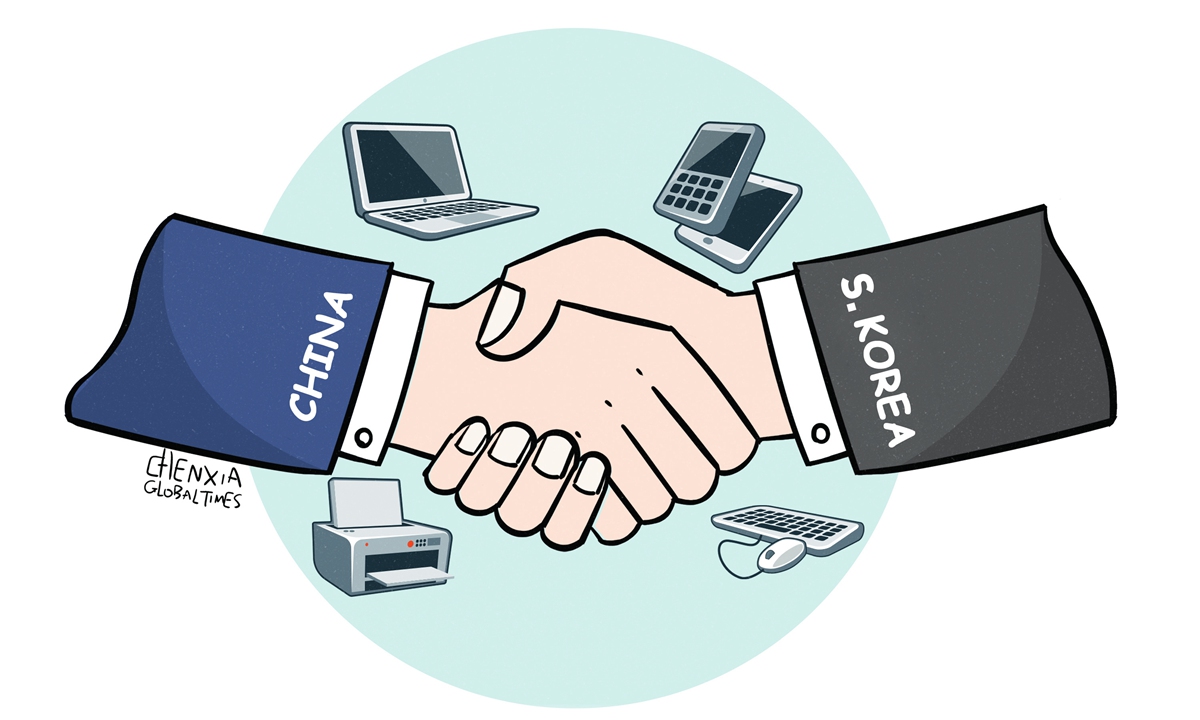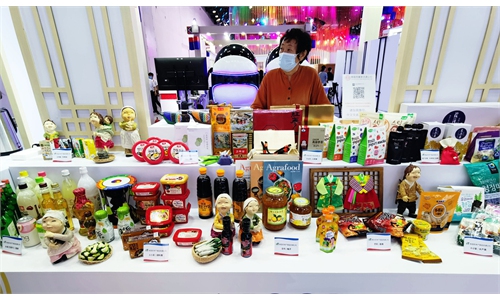
Illustration: Chen Xia/Global Times
More than 400 industrial and business elites, including representatives from over 300 Chinese and South Korean enterprises attended an economic forum in Seoul on Tuesday to discuss ways to promote pragmatic economic cooperation, South Korea's Yonhap News Agency reported.The gathering came at a time when Washington is pushing for policies that exert US influence over global technology and supply chains in its attempt to choke off China's access to advanced semiconductor technologies.
Obviously, some do not want to see China-South Korea relations will maintain healthy and keep their stable growth momentum, taking into consideration the fact that South Korean companies are important suppliers of memory chips for Chinese manufacturers. However, an economic "decoupling" is not what the vast business community wants.
The gathering of business elites in Seoul shows that people from both countries do not agree to the decoupling push, and they favor enhancing mutually beneficial cooperation in various fields. Facing Washington's decoupling push, South Korean companies have voted with their feet.
Over the past months, South Korea has recorded a trade deficit with China stretching over two quarters for the first time in almost 30 years. South Korea's export growth rate fell into negative territory in October, driven by a fall in semiconductor shipments as well as weakened trade with China - South Korea's top destination for exports.
Some analysts believe the structure of the bilateral trade is changing, saying that some intermediate goods that China once imported are being produced at home. This is a natural process, meaning China's efforts to move up the supply chains, partly driven by Washington's decoupling push, has had an impact on the economy. But, independent research and localized production in China may prompt South Korea to optimize its trade structure to narrow its trade deficit with the world's second largest economy.
Intermediate goods account for the biggest chunk of South Korean exports to China. According to the South China Morning Post (SCMP), these goods accounted for 83.6 percent of total shipments to China between January and September this year. To improve its trade balance, South Korea should expand exports of "high-tech intermediate goods that China depends on," as well as consumer goods, the Korean International Trade Association said, as reported by the SCMP.
Obviously, the association's calls to expand exports of high-tech intermediate goods run in the opposite direction to Washington's technological decoupling push. The biggest external disturbing factor for China-South Korea ties is always from Washington. Especially when pressure from the US is increasing, it is necessary for South Korea's economists and business elites to clearly reiterate their positions and attitudes, and to give their advice on economic development.
In terms of industry share of South Korea's exports, electronic products - including semiconductors, wireless communications devices and other consumer electronics - came in first, with their world-class competitiveness in some of the product categories. If South Korea wants to shore up exports and narrow its trade deficit, it should expand exports of the advantageous products that it exports to the world, such as semiconductors and other high-tech intermediate goods.
"It is necessary to secure a stable export supply chain system centered on hi-tech intermediate goods in core materials and parts," the Korean International Trade Association said.
The Chinese market is attractive to South Korean companies. Firm support for globalization and free trade has always been common ground between China and South Korea. And, the two countries could in the future continue to expand trade and economic cooperation.
The author is a reporter with the Global Times. bizopinion@globaltimes.com.cn


